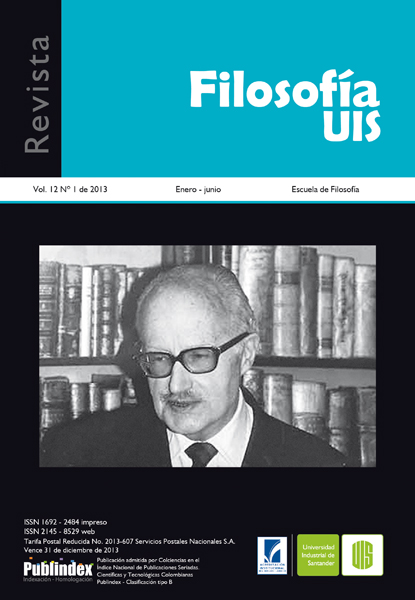Research Article
Nietzsche, dionysus and the tragedy. The end of metaphysics and the transit to another mode of thinking
Published 2013-09-13
Keywords
- metaphysics,
- being,
- Dyonysus,
- difference,
- between
How to Cite
E. Esperón, J. P. (2013). Nietzsche, dionysus and the tragedy. The end of metaphysics and the transit to another mode of thinking. Revista Filosofía UIS, 12(1), 17–42. Retrieved from https://revistas.uis.edu.co/index.php/revistafilosofiauis/article/view/3511
Copyright (c) 2013 Juan Pablo E. Esperón

This work is licensed under a Creative Commons Attribution 4.0 International License.
Abstract
Thinking this is manifest in Nietzsche facing total destruction of the metaphysical categories, as well as road showing a new way of doing philosophy to live and interact with the world. Thus, the general problem that runs through our research is to investigate if Nietzsche does indeed destroy metaphysics and announce a new experience of being or is captured by the structures of the metaphysical categories.
Downloads
Download data is not yet available.
References
- Cragnolini, M. (2007). Derrida, un pensador del resto. Buenos Aires: La Cebra.
- Deleuze, G. (1986). Nietzsche y la filosofía. Barcelona: Anagrama.
- Eggers Lan, C. y Juliá, V. E. (1994). Los filósofos presocráticos. Madrid: Gredos.
- Esperón, J. (2010). “Diálogo Nietzsche-Heidegger sobre a diferença como superação do pensamento metafísico”. Revista Trágica: Estudios sobre Nietzsche. Volumen 3. (2).pp
- Fink, E. (2000). La filosofía de Nietzsche. Madrid: Alianza.
- HEIDEGGER, M. (1990). Identidad y Diferencia. Madrid: Alianza.
- Nietzsche, F. (1971). Ecce Homo. Madrid: Alianza.
- Nietzsche, F. (1980). Sämtliche Werke in 15 Bäden. Kritiche Studienausgabe Hrsg. Von G. Colli und M. Montinari, Deutcher Taschenbuch Verlag/Walter de Gruyter, München/Berlin/New York.
- Nietzsche, F. (1995). El Nacimiento de la tragedia. Madrid: Alianza.
- Vattimo, G. (2003). El sujeto y la máscara. Barcelona: Península.
- Vitiello, V. (1999). “Federico Nietzsche y el nacimiento de la tragedia”. Secularización y nihilismo. Buenos Aires: Unsam.
